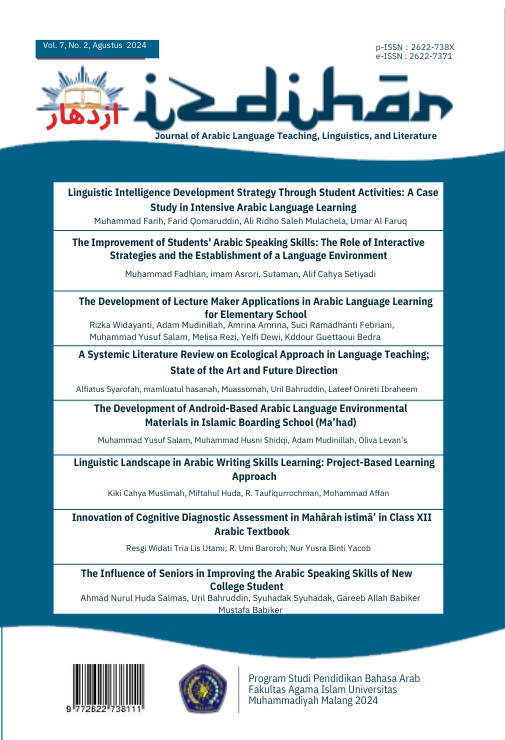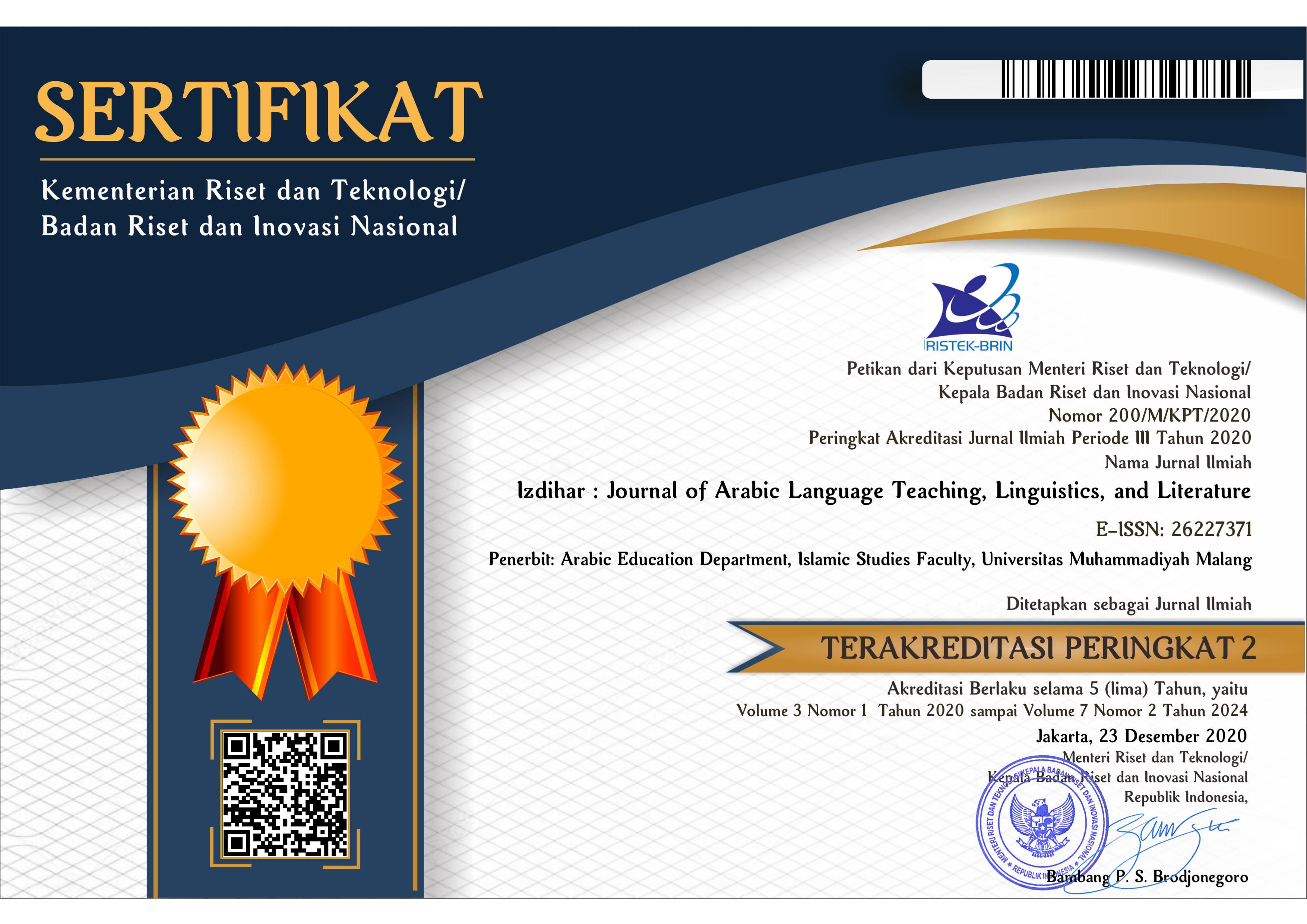The Improvement of Students' Arabic Speaking Skills: The Role of Interactive Strategies and the Establishment of a Language Environment
DOI:
https://doi.org/10.22219/jiz.v7i2.30137Keywords:
Learning strategy; language environment; speaking arabic; role of teacherAbstract
The goals of this research were to learn about the many tactics used by teachers to develop Arabic speaking skills in Pondok Modern Darussalam Gontor, and explain the various Arabic environments that help students improve their Arabic speaking skills at Pondok Modern Darussalam Gontor. This is a qualitative study conducted using a case study approach. The process of gathering information through observation, interviews, and documentation. Data Analysis Techniques comprise four steps: 1) collecting data, 2) integrating data, 3) condensing data distribution, and 4) drawing conclusions from data. The findings of this study indicate that: (1) Pondok Modern Darussalam Gontor's technique for increasing Arabic speaking skills is divided into classroom and out-of-classroom learning. Classroom learning methods include direct strategy, dialogue strategy, discussion strategy, and question and answer strategy. Outside of the classroom, there are two types of language justification strategies: direct and shared. (2) The Arabic Language Environment, which includes the development of students' confidence in speaking Arabic, as well as Discussion activities such as Vocabulary Division and Repetition, Arabic Speech, and Punishment for Violating the Official Language, contribute significantly to students' Arabic speaking skills. 3) Develop several techniques to increase pupils' speaking skills in Modern Darussalam gontor.
Downloads
References
Ahmad Helwani Syafi’i, Nurjanah, H. (2021). Problematika Pembelajaran Keterampilan Berbicara Bahasa Arab Berbasis Komunikatif Interaktif Dalam Bingkai Pembelajaran Kitab Kuning. Ibtida’iy : Jurnal Prodi PGMI, 6(1), 18. https://doi.org/10.31764/ibtidaiy.v6i1.5201
Abdel Salam El-Dakhs, D., & Phyllis Amroun, F. (2021). The Relative Contributions of Explicit and Implicit Instruction in the Learning of EFL Apologies. Humanities and Social Sciences Letters, 9(2), 122–151. https://doi.org/10.18488/journal.73.2021.92.122.151
Abdul Ghani, M. T., & Wan Daud, W. A. A. (2023). The Impact of Digital Game-Based Learning Towards Arabic Language Communication. Jurnal Komunikasi: Malaysian Journal of Communication, 39(1), 407–424. https://doi.org/10.17576/JKMJC-2023-3901-23
Abdullah, H., Ibrahim, M., Harun, H., Baharun, H., Ishak, M., & Mohd Ali, S. (2022). A Structural Equation Modelling (SEM) investigation of the L2 learning model of motivational development among Tahfiz students. Issues in Language Studies, 11(2), 1–19. https://doi.org/10.33736/ils.4359.2022
Achoita, A., & Ifadah, L. M. (2022). Penerapan Metode Cooperative Script Dalam Meningkatkan Kemampuan Berbicara Bahasa Arab Siswa Kelas X Ma Salafiyah …. Tadris: Jurnal Penelitian Dan …, 16(1), 1–14. http://ejournal.iainutuban.ac.id/index.php/tadris/article/view/201%0Ahttps://ejournal.iainutuban.ac.id/index.php/tadris/article/download/201/210
AH, H. F., Arief, Z. A., & Muhyani, M. (2019). Strategi Motivasi Belajar Dan Minat Belajar Dengan Hasil Belajar Bahasa Arab. Tawazun: Jurnal Pendidikan Islam, 12(1), 112. https://doi.org/10.32832/tawazun.v12i1.1843
Ahmed, N., Bin, K., & Hamzah, M. H. (2023). Production and perception of English consonants by Yemeni EFL learners. 12(3), 719–738. https://doi.org/https://doi.org/10.17509/ijal.v12i3.47474
Al-Assaf, N. M., Al-Wazzan, K. M., & Al-Marayat, S. H. (2022). The Effect of Using the Strategy of Flipped Class on Teaching Arabic as a Second Language. Theory and Practice in Language Studies, 12(4), 684–690. https://doi.org/10.17507/tpls.1204.08
Alhajya, N. M., Alzaghamim, S. S., & Arouri, Y. M. (2018). The impact of virtual trips on the development of Arabic language listening skills among third grade students in Jordan. Journal of Technology and Science Education, 8(1), 72. https://doi.org/10.3926/jotse.331
Amien, S., Setyosari, P., Murtadho, N., & Sulton, S. (2022). “Ana Yahanu Faqat”: A Phenomenological Study on the Performance Character and Life Success. The Qualitative Report, 27(4), 945–964. https://doi.org/10.46743/2160-3715/2022.4916
Aprilia, U. (2021). Pembelajaran keterampilan berbicara di era abad 21 berbasis pendekatan quantum. Al-Ittijah: Jurnal Keilmuan Dan Kependidikan Bahasa Arab, 13(2), 170–185. https://doi.org/https://doi.org/10.32678/al-ittijah.v13i2.4678
Bako, F. M., Masrurah, F., Tuli, F., & Arifah, D. (2018). Pengawasan dan Evaluasi Program Bahasa Arab di Pondok Pesantren. Arabi : Journal of Arabic Studies, 3(1), 61. https://doi.org/10.24865/ajas.v3i1.72
Baralt, M., Doscher, S., Boukerrou, L., Bogosian, B., Elmeligi, W., Hdouch, Y., Istifan, J., Nemouch, A., Khachatryan, T., Elsakka, N., Arana, F., Perez, G., Cobos-Solis, J., Mouchane, S. E., & Vassigh, S. (2022). Virtual Tabadul: Creating Language-Learning Community Through Virtual Reality. Journal of International Students, 12(S3), 168–188. https://doi.org/10.32674/jis.v12iS3.4638
Brosh, H. Y. (2019). Arabic language-learning strategy preferences among undergraduate students. Studies in Second Language Learning and Teaching, 9(2), 351–377. https://doi.org/10.14746/ssllt.2019.9.2.5
Budiarti, M. (2020). Pembelajaran Maharah Kalam Dengan Model Quantum Learning Dalam Rangka Menghadapi Era Desruptof 4.0 Di Kalangan Milenial. Al-Muktamar As-Sanawi Li Al-Lughah Al-Arabiyyah (MUSLA), 43–56. http://prosiding.iaincurup.ac.id/index.php/musla/article/view/4
Chuane, Q., Shukor, S. S., Yuehong, T., Xiaofen, Z., Pendidikan, U., Idris, S., & Malim, T. (2023). The Relationship Between Motivation and English Language Test Performance among Secondary Vocational Schools ’ Students in China. 10(1), 280–302. https://doi.org/https://doi.org/10.24815/siele.v10i1.2574
Columbu, A. (2022). Decolonising Arabic Language Teaching: A Case Study. Lingue Culture Mediazioni - Languages Cultures Mediation (LCM Journal), 8(2), 101–118. https://doi.org/10.7358/lcm-2021-002-colu
Daud, W. A. A. W., Teck, W. K., Ghani, M. T. A., & Ramli, S. (2020). M-Learning Boost Students’ Motivation in Learning Arabic Language Proficiency for Elementary Level. Universal Journal of Educational Research, 8(10), 4384–4392. https://doi.org/10.13189/ujer.2020.081004
Du, X., & Chaaban, Y. (2020). Teachers’ Readiness for a Statewide Change to PjBL in Primary Education in Qatar. Interdisciplinary Journal of Problem-Based Learning, 14(1), 1–15. https://doi.org/10.14434/ijpbl.v14i1.28591
Fatoni, A. (2019). Peran Motivasi Belajar Bahasa Arab Terhadap Aktivitas Pembelajaran: Studi Kasus Mahasiswa PBA Universitas Muhammadiyah Malang. El-Tsaqafah : Jurnal Jurusan PBA, 18(2), 183–202. https://doi.org/10.20414/tsaqafah.v18i2.1869
Gharaibeh, M., & Alhassan, A. A. (2023). Role of teachers in teaching Arabic letters to young children of UAE: Exploring criteria of Arabic letters teaching. Cogent Education, 10(1). https://doi.org/10.1080/2331186X.2023.2191392
Ghosheh Wahbeh, D., Najjar, E. A., Sartawi, A. F., Abuzant, M., & Daher, W. (2021). The Role of Project-Based Language Learning in Developing Students’ Life Skills. Sustainability, 13(12), 6518. https://doi.org/10.3390/su13126518
Ilhami, R., Hasan, N., Wargadinata, W., Fadhlan, M., & Fikri, A. (2021). The Effectiveness of Contextual Teaching Learning Through Zoom in Improving Arabic Speaking Skills During Covid-19. An Nabighoh, 23(2), 169. https://doi.org/10.32332/an-nabighoh.v23i2.3272
Imam Wahyudu Siti Umi Azizatul Khofifah. (2022). Media Talking Stick dalam Pembelajaran Mahārah al-Kālam di MA Assunniyyah Jember. An-Nuqtah, 1(3), 63–69. https://doi.org/https://doi.org/10.1234/an-nuqtah.v1i3.889
Karima, K. I. (2020). Penerapan Metode Edutainment Melalui Permainan Simak-Ulang-Ucap Untuk Meningkatkan Keterampilan Berbicara Bahasa Arab. ALSUNIYAT: Jurnal Penelitian Bahasa, Sastra, Dan Budaya Arab, 2(1), 58–68. https://doi.org/10.17509/alsuniyat.v2i1.24072
Kerras, N., & Baya Essayahi, M. L. (2022). Education and COVID-19: Learning Arabic Language and Perspectives. Electronic Journal of E-Learning, 20(1), pp36-52. https://doi.org/10.34190/ejel.20.1.1976
Khasawneh, N. (2022). An Analysis of Learners’ Needs of Arabic as a Foreign Language at Jordanian Universities. Jordan Journal of Modern Languages and Literatures, 14(3), 535–549. https://doi.org/10.47012/jjmll.14.3.5
Mahdi, D. A. (2022). Improving Speaking and Presentation Skills through Interactive Multimedia Environment for Non-Native Speakers of English. SAGE Open, 12(1), 215824402210798. https://doi.org/10.1177/21582440221079811
Marlina, L. (2016). EFEKTIFITAS METODE LANGSUNG DALAM PENGAJARAN KETERAMPILAN BERBICARA BAHASA ARAB. Al-Tsaqafa: Jurnal Ilmiah Peradaban Islam, 13(2), 211–226. https://doi.org/10.15575/al-tsaqafa.v13i02.1973
Masitoh, S., Arifa, Z., Ifawati, N. I., & Sholihah, D. N. (2023). Language Learning Strategies and the Importance of Cultural Awareness in Indonesian Second Language Learners. Journal of Language Teaching and Research, 14(2), 436–445. https://doi.org/10.17507/jltr.1402.20
Misdar, M. (2018). Mengkritisi Faktor-Faktor Kegagalan Akademik Siswa Dalam Belajar. Tadrib: Jurnal Pendidikan Agama Islam, 4(2), 205–224. https://doi.org/10.19109/tadrib.v4i2.2465
Muid, A., Fadhlan, M., Rasidin, R., & Jabir, M. D. (2022). Project-Based Learning Models Approach In Improving Arabic Speaking Ability. An Nabighoh, 24(1), 17. https://doi.org/10.32332/an-nabighoh.v24i1.4559
Nafisah, Z. (2023). Peningkatan Keterampilan Berbicara (Maharah Kalam) Bahasa Arab Melalui Media Gambar. LANGUAGE : Jurnal Inovasi Pendidikan Bahasa Dan Sastra, 2(4), 319–327. https://doi.org/10.51878/language.v2i4.1877
Ningtias, R. K. (2022). Darajat: Jurnal PAI Volume 5 Nomor 1 Juni 2022 103. Darajat: Jurnal PAI, 5, 103–112. https://doi.org/https://doi.org/10.24256/jale.v2i1.1206
Nulaila, N., Nurdiniawati, N., & Amnah, S. (2022). Meningkatkan Kemampuan Maharah Kalam dan Kitabah Pada Mahasiswa Prodi PBA Fakultas Tarbiyah IAI Muhammadiyah Bima. Taroa: Jurnal Pengabdian Masyarakat, 1(1), 39–51. https://doi.org/10.52266/taroa.v1i1.739
Nurazmi, I. A. (2020). Pengaruh Penggunaan Whatssapp dan Metode Pembelajaran Based Learning Pada Pembelajaran Bahasa Arab. Hijai - Journal on Arabic Language and Literature, 3(2), 66–81. https://doi.org/10.15575/hijai.v3i2.8656
Nurbaiti, A., & Handican, R. (2023). Systematic Literature Review ( Slr ) : Peran Lingkungan Bahasa dalam Meningkatkan Keterampilan Siswa Berbahasa Arab. 03(01), 1–11. https://doi.org/https://doi.org/10.55352/pba.v3i1.83
Razman, S. M., Ismail, Z., & Ismail, W. M. A. S. (2022). Developing a Teaching Module on Arabic Vocabulary Based on the Four Strands Theory for Pre-University Students in Malaysia: A Needs Analysis. Theory and Practice in Language Studies, 12(11), 2263–2273. https://doi.org/10.17507/tpls.1211.05
Ritonga, A. W., Mela, D. A., & Ayu Desrani. (2022). Strategi Penguatan Keterampilan Berbahasa Arab Siswa Sekolah Dasar Berbasis Tahfizh Qur’an. EL Bidayah: Journal of Islamic Elementary Education, 4(2), 160–176. https://doi.org/10.33367/jiee.v4i2.2825
Ritonga, M., Asrina, A., Widayanti, R., Alrasi, F., Julhadi, J., & Halim, S. (2020). Analysis of Arabic Language Learning at Higher Education Institutions with Multi-Religion Students. Universal Journal of Educational Research, 8(9), 4333–4339. https://doi.org/10.13189/ujer.2020.080960
Ritonga, M., Febriani, S. R., Kustati, M., Khaef, E., Ritonga, A. W., & Yasmar, R. (2022). Duolingo: An Arabic Speaking Skills’ Learning Platform for Andragogy Education. Education Research International, 2022, 1–9. https://doi.org/10.1155/2022/7090752
Røe, Y., Rowe, M., Ødegaard, N. B., Sylliaas, H., & Dahl-Michelsen, T. (2019). Learning with technology in physiotherapy education: design, implementation and evaluation of a flipped classroom teaching approach. BMC Medical Education, 19(1), 291. https://doi.org/10.1186/s12909-019-1728-2
Saleh, M. M., El-Hamshary, A. A. S., Farag, E. T. F., & Boshnaq, M. H. (2023). Acquisition of consonant clusters and remediation of cluster reduction in Egyptian children. The Egyptian Journal of Otolaryngology, 39(1), 16. https://doi.org/10.1186/s43163-023-00379-2
Sanjaya, B., & Hidayat, W. (2022). Student speaking skill assessment: Techniques and results. International Journal of Evaluation and Research in Education (IJERE), 11(4), 1741. https://doi.org/10.11591/ijere.v11i4.22782
Shehab, R., & M Zeki, A. (2015). Web Assisted Language Learning System For Enhancing Arabic Language Learning Using Cognates. Jurnal Teknologi, 77(19), 107–112. https://doi.org/10.11113/jt.v77.6538
Suriagiri, S., Akrim, A., & Norhapizah, N. (2022). The influence of school principal supervision, motivation, and work satisfaction on teachers’ performance. Cypriot Journal of Educational Sciences, 17(7), 2523–2537. https://doi.org/10.18844/cjes.v17i7.7684
Susanto, W. A., Jinan, M., & Muthoifin, M. (2023). Strategi Guru Bahasa Arab dalam Meningkatkan Kemampuan Berbahasa Arab Siswa Kelas 10 Matrikulasi MA Al Irsyad Tengaran. JIIP - Jurnal Ilmiah Ilmu Pendidikan, 6(5), 3181–3190. https://doi.org/10.54371/jiip.v6i5.1985
Umudini, A., Iswandi, I., & Arifin, M. M. (2023). Analisis Faktor Kesulitan Belajar Bahasa Arab Kelas V Madrasah Ibtidaiyah Pesantren Sabilil Muttaqien (PSM) Kepuhrejo Kediri. Journal on Education, 5(3), 9346–9355. https://doi.org/10.31004/joe.v5i3.1741
Zhu, W., Liu, Q., & Hong, X. (2022). Implementation and Challenges of Online Education during the COVID-19 Outbreak: A National Survey of Children and Parents in China. Early Childhood Research Quarterly, 61, 209–219. https://doi.org/10.1016/j.ecresq.2022.07.004
Zigh, E., Abdalli, R. H., & Kouninef, B. (2022). Impact of E-Learning on INTTIC Students during the COVID-19. Journal of Education and E-Learning Research, 9(1), 28–37. https://doi.org/10.20448/jeelr.v9i1.3738
Downloads
Published
How to Cite
Issue
Section
License
Copyright (c) 2024 Muhammad Fadhlan, imam Asrori, Sutaman, Alif Cahya Setiyadi

This work is licensed under a Creative Commons Attribution-ShareAlike 4.0 International License.
Copyright Notice
Authors who publish with this journal agree to the following terms:
- Authors retain copyright and grant the journal right of first publication with the work simultaneously licensed under a Creative Commons Attribution-ShareAlike 4.0 International License that allows others to share the work with an acknowledgment of the work's authorship and initial publication in this journal.
- Authors are able to enter into separate, additional contractual arrangements for the non-exclusive distribution of the journal's published version of the work (e.g., post it to an institutional repository or publish it in a book), with an acknowledgment of its initial publication in this journal.
- Authors are permitted and encouraged to post their work online (e.g., in institutional repositories or on their website) prior to and during the submission process, as it can lead to productive exchanges, as well as earlier and greater citation of published work (See The Effect of Open Access).
Copyright (c) 2019 Izdihar : Journal of Arabic Language Teaching, Linguistics, and Literature

This work is licensed under a Creative Commons Attribution-ShareAlike 4.0 International License.


















